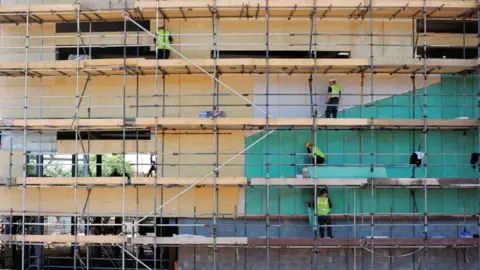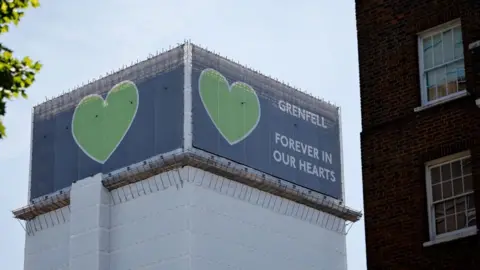Developers pledge to fix unsafe cladding on tall buildings
 Getty Images
Getty ImagesDevelopers have struck a deal with the government to help fix unsafe cladding on tall buildings they have worked on.
Housing Secretary Michael Gove said it was a "significant" step to ensuring "those responsible pay to solve the crisis they have helped to cause".
An industry levy will collect £3bn and developers will pay at least £2bn.
Companies failing to pledge to fix tall buildings they have worked on in the past 30 years will face consequences, Mr Gove has said.
Housebuilders who do not sign up to the voluntary pledge could be banned from new construction, the government has warned.
"We will do whatever it takes to hold industry to account, and under our new measures there will be nowhere to hide," said Mr Gove.
More than 35 housebuilders so far have committed to fixing unsafe cladding on all medium and high-rise buildings, taller than 11m (36ft), under the new agreement. While currently voluntary, it is to become legally enforceable.
After the Grenfell Tower fire which killed 72 people in 2017, flammable cladding and other fire safety defects were identified in hundreds of blocks of flats in the UK.
 Getty Images
Getty ImagesLabour's shadow housing minister Matthew Pennycook said the announcement "falls short of what is needed".
"Having missed his first and second deadline for the £4bn he promised to extract from developers, the agreement announced by Michael Gove today only raises half that amount with the names of a series of major developers missing," he said.
The government needed to "take action against those companies that are still refusing to do the right thing" so leaseholders can be protected, he added.
The Local Government Association said it was "pleased" the government had listened to calls it had been "making for several years to protect leaseholders from the costs of two decades of industry failure".
It called for the same protection to be given to council tenants and council taxpayers "by exempting councils from the developer levy and funding the remediation of social housing on the same basis as private housing".
The deputy leader of the Liberal Democrats said it was "right" for developers to pay to remove unsafe cladding from buildings, but "people are facing a fifth miserable year stuck in homes which are not safe".
An "unequivocal commitment" that leaseholders would not have to "shoulder the cost of remediation" was needed, said Daisy Cooper.
"Liberal Democrats continue to call for the government to stump up the cash so we can make homes safe, and then go after those responsible."
In February the government guaranteed no leaseholder would "have to pay a penny" to remove cladding from buildings.
The new scheme will be partly funded through an extension to the building safety levy, chargeable to all new residential buildings in England.
Cladding means adding a new layer of material to the outside of a building - to increase insulation, offer weather protection or improve the appearance of a building.
